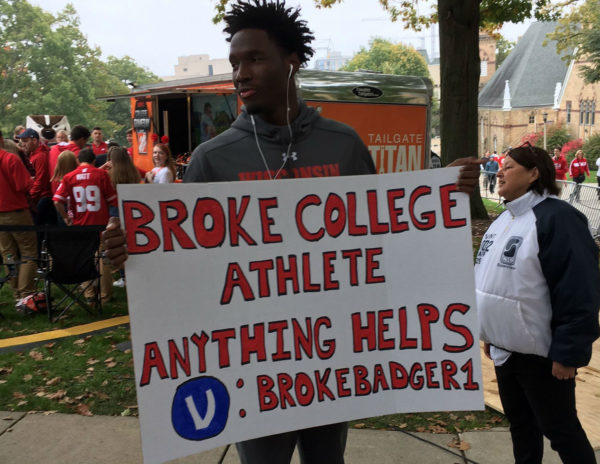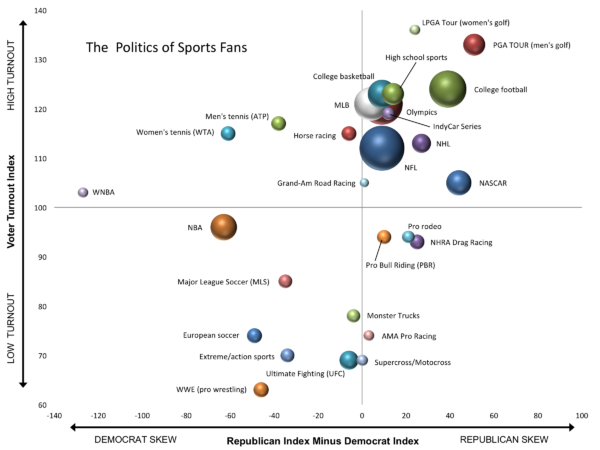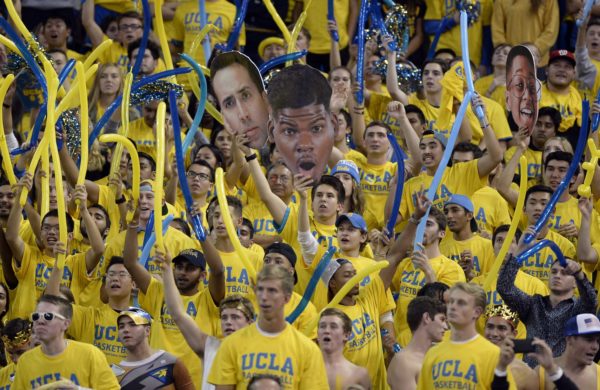Media Timeout: College Basketball Gets Political – What Took So Long?
Posted by Will Tucker on December 20th, 2016College basketball places huge emphasis on individual games — showdowns between top-ranked teams, annual rivalry clashes, single-elimination tournaments — but it’s important from time to time to take a step back and look at the bigger picture. The Media Timeout considers how fans and journalists watch, follow and talk about the sport.
We’re one month into the college basketball season, and mercifully, a month closer to closing the book on 2016. (Is it dead yet? I think I saw it twitch. Poke it again…) But the unrest that this year ignited will continue to flare up long after we’ve replaced the calendar. As political conflict bleeds into the most distant recesses of our day-to-day lives, will college basketball become an unlikely battleground?
The Forecast Calls for Activism
Even before the 2016-17 season tipped off, many commentators predicted that this season would be more politically charged than usual in the days after Election Day. “College basketball likely will launch a new round of athlete protests,” was a headline of a story from Marcus Fuller at the (Minneapolis) Star Tribune, who reasoned that the sport “has had time to prepare for demonstrations as they watched them play out on football fields across the country.” Chicago Tribune columnist Shannon Ryan agreed: “More activism, especially related to racial injustices, in college arenas could be on the way.”
Those forecasts were validated by the offseason activism taking root at Wisconsin, where preseason Big Ten Player of the Year Nigel Hayes quickly cemented his status as the preeminent “woke” college athlete by protesting everything from the NCAA’s interpretation of amateurism to campus racism to police violence. Native American teammate Bronson Koenig, who two seasons ago made waves when he spoke out against the Washington Redskins’ name, traveled to North Dakota to protest the controversial Dakota Access Pipeline (DAPL), subsequently writing an introspective essay about his experience for The Players Tribune. Well before Thanksgiving, the New York Times had already traveled to Madison to profile “College Basketball’s Most Political Locker Room.”

Wisconsin’s Nigel Hayes has challenged everything from amateurism to campus racism in 2016 (Madison265)
A month later, it’s unclear whether this season will be remembered as politically active at the sport’s landscape level beyond the Badgers’ vanguard. Other examples have cropped up here and there: In Duke’s season opener, Marist players wore rainbow socks to protest North Carolina’s discriminatory “bathroom law” – a move supported by its head coach. Weeks later, Maine players made a similar statement when they sported pro-LGBTQ warmups prior to their game at Cameron Indoor Stadium. After his players met with representatives of Duke’s Athlete Ally program, which promotes an inclusive culture across the school’s athletic department, head coach Bob Walsh commented, “I think our guys now understand a little bit more the impact they can have as leaders on campus.”
But even if this season does become a watershed moment for activism in college basketball, what took it so long? Why has the sport remained relatively apolitical while other sports at both the professional and college level have moved in the other direction? Even college football – with its deeply conservative heritage – has in the last two years seen players force a university president to resign, kneel during the national anthem in deep-red Nebraska, and challenge the bedrock of the NCAA’s business model.
“Stick to Sports”
For many fans, few conventions are as sacred as the line between sports and politics. Sports allow us to check our real-world anxieties at the door and invent identities around the places we live, or the schools we attended, or the teams we adopt – rather than ideology, gender, race or religion. Once those other differentiators enter the equation? Poof – the illusion of tribal unity falls away, exposing deep divisions and the cultural turmoil they entail.
So, it’s no surprise that fans will often defend this kind of willful compartmentalizing to the end of the Earth. Those who cater to them – sports media, programs and franchises, leagues and associations – tend to respect the boundary, either out of deference to tradition or simply to alienate as few consumers as possible. (The infamous Michael Jordan line, “Republicans buy sneakers, too,” embodies that sensibility, regardless of whether he actually said it.) Those who deviate from the apolitical are told to “stick to sports.”
But what happens when athletes take it upon themselves to blur that line, using the court or field as a forum to express and advocate their beliefs? A decade ago, at a historic low point for political dissidence among high-profile athletes, they may have been urged to “shut up and play,” as one columnist told Dallas point guard Steve Nash after the mild-mannered Canadian player wore a mildly anti-war t-shit. That’s no longer the case in the era of Colin Kaepernick, LeBron James and Nigel Hayes.
Hardwood as a Megaphone
On paper, college basketball seems like an ideal platform for political advocacy or defiance. Its sibling, college football, tends to sterilize individual identity with helmets and face masks – and a phalanx of interchangeable bodies on the sideline. Conversely, fans of most major basketball programs will become intimately acquainted with almost everyone in a jersey; players outside of the starting lineup (or even the deep rotation) routinely achieve beloved status in places like Lexington, Lawrence and Bloomington.
Although it still very much embraces the “team game” ethos, differentiated itself from the superstar-centric NBA, college hoops is ultimately a showcase of individual talent – and it’s an environment where talented individuals with distinctive personalities take on a special luminance. Popular basketball players, while not untouchable, enjoy a measure of job security unknown to all but an elite few of their football peers. Jordan Hill, the third Wisconsin player profiled by the New York Times, averages a modest 10 minutes and 1.6 points per game, but is no less outspoken than teammates Hayes and Koenig, who lead the team in scoring. Meanwhile, it’s hard to imagine Maine’s football team going on the road to Duke and executing a political protest that could jeopardize its program’s future trips to Durham (and the critical revenue that those games generate).
Visibility: Blessing, Curse, or Both?
“There are fewer players and coaches on basketball teams, [which] emboldens individual players to engage in protest and makes collective action easier,” said Central Michigan history professor Lane Demas, an expert on race and sport, in an email to Ryan, the aforementioned Chicago Tribune columnist. Still, it’s possible that this lack of anonymity places basketball players under an intensified magnifying glass in the eyes of authority figures within their programs. Lane also pointed out, “Today, coaches and administrators still have tremendous power over these players. That’s probably the thing that’s changed the least in the long history of American college sport.”

Where do sports fans fall on the political spectrum? (Originally appearing in National Journal via National Media Research. Reprinted with permission by authors Will Feltus and Mike Shannon)
But even if their individual visibility can discourage college basketball players from speaking out, don’t the other “enabling conditions” for political activism compensate for it? Not only do college basketball fans tend to lean considerably to the left of football fans (as shown in the graphic above), but the same can be said of the sports media and coaching staffs: a September poll of over 100 coaches revealed that Hillary Clinton was favored over Donald Trump by a 71-13 margin. Meanwhile, social media networks offer these athletes a relatively safe space for self-expression that simply wasn’t available 20 years ago.
But favorable circumstances alone can’t compel players to think and act radically; they can only make it easier for those who want to speak out todo so. As college hoops legend and luminary Grant Hill points out in a recent interview with Black Sports Online, not every athlete is destined to use the sport’s platform:
Just because you go to church doesn’t mean you should be preaching. I think we expect all of our athletes to be a voice. It has to be genuine, it has to be real, you have to be informed. Not everyone should be put in that position. It’s got to be a certain profile, it’s got to be the right person. Someone who really is committed, passionate and is informed.
[…]
You have to know what you are talking about, you have to have credibility, not just as an athlete but as an athlete who knows and is truly aware of what is happening.
“The Genie Is Out of the Locker”
Hill, who knows the landscape of the sport as well as anyone, emphasizes that we can’t expect every 18- to 22-year-old to rock the college basketball boat by taking a contentious stand. Even for those players with fully formed political convictions, there’s still safety in numbers and most don’t have the luxury of playing alongside a Hayes or Koenig. And unlike successful NBA players, nor do college athletes have the luxury of a publicist or agent.
College basketball affords a special visibility to its athletes, but utilizing this platform to to tackle bigger issues demands some exceptional personality traits of kids who for the most part aren’t old enough to drink. Those traits include a level of rare self-awareness and political consciousness, as Hill points out, but also a willingness to endure the heightened scrutiny (and often scorn) that comes with speaking out.
It remains to be seen how many of these voices will emerge in college hoops this season, but it’s safe to say that the sport’s apolitical air tone is vanishing, as it is elsewhere. NBA great Kareem Abdul-Jabbar, perhaps the most famous living athlete-activist after the passing of Muhammad Ali, was referring to college athletes as well as pros when he penned these words in Time last month: “The days of the silenced jock are long gone… The genie is out of the locker and no amount of Ace bandages will bind him back to muteness.”












































